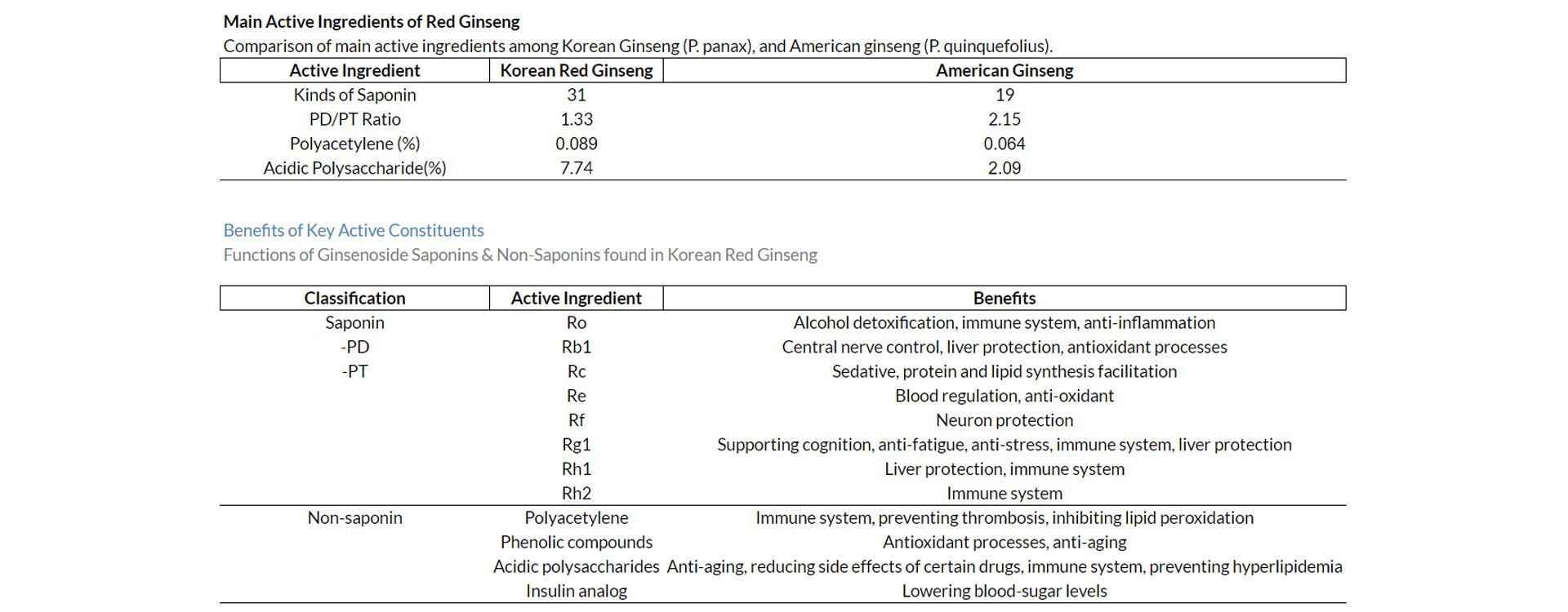CHEONGKWANJANG'S SECRET TO SUCCESS
CheongKwanJang
As the world's leading ginseng company, KGC's Ginseng R&D center has 140 researchers with
Ph.Ds. and Master Degrees on staff, ensuring safety and quality, and whom have generated
over 184 ginseng patents, proven by generating over 420 ginseng research studies, and
conducting hundreds of safety checks on every crop, every year, before planting, during
cultivation, and prior to selling. We promise to earn the trust of our customers in every
healthy product we sell.
SCIENTIFICALLY PROVEN FUNCTIONS OF GINSENG
Korean Red Ginseng is so internationally famous for its healthy properties that the scientific name for its species was designated as Panax ginseng C.A. Meyer (panax being the Latin term for "a cure-all"). While ginseng cannot cure all ills, it does have a variety of healthy effects, which modern scientific research has confirmed. But not all ginsengs are the same. While there are many species and types of ginseng, only Korean ginseng, which has been grown for 6 years (to its full-maturity), which has been scientifically proven and affirmed, by the Korean FDA, as a functional food, which supports these healthy functions:
Boost energy & bodily stamina
Support fatigue resistance
Boost the immune system
Enhance Blood Circulation
Support Memory Functions

While Korean ginseng is classified as a dietary supplement, not a drug (and has no doping effects), it is no wonder that Korean ginseng has consistently held the #1 spot for most recommended traditional herbal medicine in the herbalist communities. The 10th International Symposium on Ginseng was held in 2010 and attended by approximately 1,500 scholars and researchers from 15 countries such as the United States, Europe and Asia. More than 300 papers were submitted with their findings supporting ginseng's efficacy.

KOREAN RED GINSENG, THE ORIGINAL SUPER FOOD
While modern scientific has confirmed the above claims, such that they have received approval from the Korean-FDA, there are seven major benefits of ginseng as described in traditional Eastern medical records. Since ancient times, long before clinical trials, many Korean and Chinese medical documents referred to these records and prescribed Korean ginseng to support bodily functions associated with certain conditions. In China, the historically referenced functions of ginseng are classified as, "The Seven Major Benefits of Ginseng." These are outlined below:
The Seven Major Benefits of Ginseng
1) Boosting Stamina
Ginseng relieves stress by boosting, both, mental
vitality and physical energy, while allowing for bodily calm. It improves body
constitutions, when individuals are tired or lack energy, fighting fatigue.
2)
Supporting Metabolism and the Cardiovascular System
Ginseng is said to help
to improve specific metabolic functions and bodily growth and normal repair by supporting
blood formation, oxygenation, and helping to regulate blood circulation. Good blood flow was
said to support an integrated system of key organs, resulting in internal synergy and
well-being.
3) Calming the Nerves
Unlike plants which contain
caffeine, ginseng is caffeine-free, and does not contribute to stress. It is said to support
the adrenal system and was noted to strengthen mental vitality while simultaneously calming
the body, bringing it more into balance. By helping to reduce stress and anxiety, physical
well-being and mental health are improved.
4) Supporting Healthy Lung
Functions
Ginseng was said to help loosen coughing by supporting healthy
respiratory functions, and is said to be good for the lungs, helping to keep them strong, as
they interface with healthy blood circulation, resulting in good oxygenation for the body
and easier breathing.
5) Supporting the Spleen and Stomach
Ginseng
may improve one's appetite and help with intestinal regularity by supporting healthy stomach
and digestive tract functions. Ginseng has been historically said to be beneficial for some
diabetics (under supervision of one's physician, if prescribed drugs for this condition) and
even to help quench thirst.
6) Detoxification
Ginseng has been
said to help the body naturally process and remove toxins, by boosting the immune system. It
is said to aid in cleansing the bowels, and support intestinal immune system
functions.
7) Healthy Aging
Korean ginseng helps to promotes
healthy skin, support healthy blood flow within skin, and support healthy-aging functions
and is therefore used in a variety of beauty products, and is the hidden beauty secret of
several well-known supermodels in, both, South Korea and the West.
WHAT MAKES KOREAN RED GINSENG SO POWERFUL?
Korean Red Ginseng is rich in healthy plant saponins, specifically called ginsenosides, which evolved to help the plant survive in harsh environments. Ginseng saponins have been shown clinically to have a powerful adaptogenic effect, helping human bodies achieve homeostasis by bringing them back into balance and helping to fight stress on a cellular level. Although ginseng is not drug, dozens of research papers indicate that Korean Red Ginseng and the healthy components found in Korean Red Ginseng help the body resist harmful viruses. This supports the claim that Korean ginseng helps boost the immune system and illustrates why it has been historically used as a traditional medicine for 2,000 years.

In fact, Korean Red Ginseng is the most famous medicinal herb in the Eastern tradition and has been used safely throughout Asia and world for centuries. Western explorers in Asia brought the plant back to Europe and remarked how it "extended life and vitality."
Ginseng came to be used as clean, plant-based nutrition providing healthy-energy to hard workers, atheletes, and those wishing to support a healthy lifestyle with nature's original super food. Containing more than 30 varieties of healthy ginseng saponins and ginsenosides, Korean Red Ginseng ginseng is widely considered to be the world's most powerful form of ginseng, yet is incredibly difficult to grow, which is why it sells at a higher price.

THE RIGHT DOSAGE FOR YOU
When beginning a ginseng regime, you may wish to begin with a half serving and build-up to full servings as your body builds tolerance. Ginseng is an "adaptogenic herb," which means it supports the adrenals and helps the body to achieve homeostasis by supporting the body's efficiency at fighting cellular stress. Everybody is different and has different needs. Listen to your body. Although side-effects are rare and uncommon, reduce dosage or stop usage if you are unsure.
CONFIDENCE & COMPETENCE ROOTED IN R&D CAPABILITY
KGC has the utmost confidence in the quality of our products. This confidence is rooted
in nearly 120 years of traditional know-how, and over 80 years of dedication to modern
research and development, accompanied by cutting-edge technology. Founded in 1937, the Korea
Ginseng Research Institute issued a new era of innovation, bringing our traditional
craftsmanship into the modern world. In cooperation with health and medical communities at
home and abroad, our 140 researchers with PhDs and Master Degrees conduct research on
cultivation techniques and soil management, and apply the latest technologies to develop new
innovations in processing and ensure quality control to produce effective products you can
trust.
Regular users of KGC's CheongKwanJang brand of Korean Red Ginseng products
understand that quality speaks for itself. Nevertheless, sometimes it is good to be
recognized. KGC has received Current Good Manufacturing Practices certifications ("cGMPs")
from major countries around the world, including Australia, South Korea, Japan, and we
conform to or exceed the rules issued by the U.S. FDA. We have acquired HACCP (Hazard
Analysis & Critical Control Points) certification, ISO 22000 (International Organization
for Standardization for Reliable Food Management Safety Systems) certification, and we are
the first ginseng company to ever have acquired accreditation from the internationally
certified KOLAS (laboratory accreditation) on 5 criteria and 192 items.
We invest
a full 2 years just to secure the finest, uncontaminated, pollutant-free planting fields,
another 6 years into growing Korean ginseng under a quality control scheme following 293
criteria, carried out over 7 rounds of full-scale review, enforced by our team of R&D
researchers. This is our commitment to quality.
Our customers can feel the
difference.
* These statements have not been evaluated by the Food and Drug Administration. These products are not intended to diagnose, treat, cure or prevent any disease.